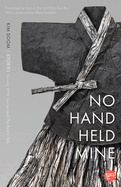
No Hand Held Mine by Kim Soom, who's won every major Korean literary award, offers two extraordinary novellas, Granny Wild Goose and The Root's Tale, jointly translated by Joon-Li Kim and Doo-Sun Ryu.
Granny Wild Goose is a breathtaking homage to Gil Won-Ok (1928-2025), one of the last surviving comfort women when Kim interviewed her before the novella's original 2018 publication. By then, the nonagenarian's memory was in decline; Kim hauntingly mimics those gaps by writing in elliptical verse, creating white space, leaving half-empty pages. Hoping to earn 20 won to free her father from jail, Gil went to Manchuria at 13 for the promise of a job but was forced into sexual slavery for Japanese soldiers: "ten, twenty, thirty soldiers at a time visited our thirteen-, fourteen-year-old bodies." At 71, she was finally able to speak the unspeakable. Kim unleashes her silence and shatters hearts and souls.
A breath, a break seems necessary before delving into The Root's Tale, featuring a "stagnant relationship" between a 39-year-old narrator and her artist boyfriend, whose medium is (mostly) tree roots. His latest project incites memories of the narrator's late great-aunt, particularly her wizened hand that, decades previously, had reached for the narrator's only to be fervently rejected. Without permission, the artist exposes that severed connection.
In both stories, Kim's vulnerable first-person narration encourages heightened empathy, particularly transforming readers into witnesses in Granny Wild Goose. History professor Alexis Dudden's foreword addresses the Japanese government's ongoing refusal to acknowledge their heinous war crimes against comfort women, underscoring the urgency of Kim's outstanding storytelling. --Terry Hong

